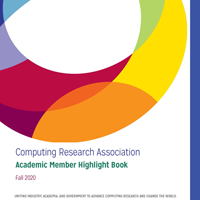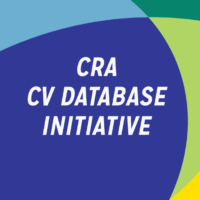Expanding the Pipeline – CAHSI introduces National Virtual Research Experience for Undergraduates
By Patricia Morreale (Kean University), Elsa Villa (The University of Texas at El Paso), and Ann Gates (The University of Texas at El Paso)
To identify and broadly engage the next generation of computer science researchers, the Computing Alliance of Hispanic Serving Institutions (CAHSI), an NSF INCLUDES Alliance[1], piloted a national virtual Research Experience for Undergraduates (vREU) during the summer of 2020. Funded by an NSF RAPID grant, the pilot provided undergraduate research experiences for 50 students and 20 faculty drawn from 20 colleges and universities widely distributed throughout the continental U.S. and Puerto Rico. The program used the Affinity Research Group (ARG) model to guide faculty mentors throughout the experience. ARG is a CAHSI signature practice with a focus on deliberate, structured faculty and student research skills development. At weekly meetings, Drs. Morreale, Villa, and Gates discussed and provided resources for specific skills that were appropriate at a specific point in time of a student’s research experience. Faculty mentors put skills development into immediate practice throughout their summer research program.
The CAHSI vREU pilot was inspired by the NSF-funded CAHSI INCLUDES Community Workshop, “Building CISE Research Capacity at Hispanic-Serving Institutions,” held in July 2019 that brought together Hispanic researchers and researchers from Hispanic Serving-Institutions (HSIs) to make recommendations on how to increase representation of Hispanics and HSIs in the NSF Computer and Information Science & Engineering (CISE) directorate’s portfolio. One of the recommendations was to extend summer REUs to those students who might be excluded through alternative approaches to physical travel and residency due to year-round jobs, family obligations, lack of short-term housing options, and other insurmountable logistics. Doing so would enable a larger, more representative national group of undergraduates to participate. Summer REUs are vital to the national interest, as they serve as a key identification point for the next generation of graduate students and researchers.
Responding to this, CAHSI’s vREU program distinctively uses the Affinity Research Group (ARG) model for the mentor-mentee engagement, and the vREU faculty mentors become part of a cohort community themselves. CAHSI vREU faculty mentors meet weekly to discuss best practices for working with undergraduate researchers, share ideas, and receive mentoring training and materials for use with their students in the following week. The CAHSI vREU model shares a research focus with other models, such as CRA-WP’s Collaborative REU (CREU, paused in 2018), which paired faculty and students from the same school, and the Distributed REU (DREU), which identifies a host faculty member and institution and supports students who apply to travel and work with the host faculty member on the host campus. However, CAHSI’s vREU program is distinguished from these other programs because of its use of the Affinity Research Group (ARG) model for the mentor-mentee engagement while forming a community among the vREU faculty mentors themselves. The CAHSI vREU methodology supports constructive critique and the deliberate development of research skills without requiring student relocation, enabling a larger community of students and faculty to participate and move undergraduates towards graduate study. The research topics investigated in the CAHSI vREU pilot are rigorous and include machine-learning, artificial intelligence, computer vision, dynamical systems, and healthcare informatics, among other topics.
A highlight of this summer work, in addition to the identification of new undergraduate student researchers in computing, is the development of a faculty cohort trained in best practices for the ARG cooperative-team framework including building positive interdependence, promotive interaction, accountability, group and professional skills development, and reflection. While the COVID-19 circumstances have been devastating and natural disasters, such as the hurricanes in Puerto Rico and wildfires in California and Oregon have been adversely impactful, the CAHSI vREU model has allowed students, during the summer of 2020, to continue to pursue their goals, with empathic faculty mentoring. While the faculty members themselves may or may not have participated in undergraduate research, or followed an undergraduate path like their current students, the ARG model provides the faculty with techniques identified as contributing to student persistence and success. Outcomes observed include students asking their faculty mentors about graduate school and future research opportunities, neither of which they knew of before participating in the CAHSI vREU program. An additional workshop for vREU students and faculty focuses on graduate student applications, scholarship applications, and expectations for future success.
The vREU pilot was designed as a collaborative effort with Dr. Ann Gates, the CAHSI national INCLUDES lead and Vice Provost of Faculty Affairs at The University of Texas El Paso (UTEP); Dr. Elsa Villa, CAHSI lead for Capacity Building and Director, the UTEP Center for Education Research and Policy Studies in the College of Education; Dr. Patricia Morreale, Professor and Chair at Kean University and lead of the CAHSI INCLUDES North region; and CAHSI regional leads. Funded in July 2020, the CAHSI vREU pilot is based on the CAHSI national design for collective impact, using the West, Southwest, North, and Southeast regional university communities of faculty leads, researchers, and students to personalize the faculty and student development experiences. The 8-week program had a goal to deliberately integrate students’ research and professional skills by working on a research project. “We’re excited to share the vREU opportunity and ARG training with our growing community,” said Dr. Gates, “and we’re looking forward to see the exciting research that will come from this summer.” Student participants worked in virtual teams with faculty mentors to develop their research projects. The outcome of the program will include a final presentation of research posters at the Great Minds in STEM Conference in October 2020, as well as virtual display on the CAHSI website (www.cahsi.org). The faculty and student development materials from this activity will be added to the CAHSI Signature Practices available on CAHSI’s website and used nationally for broadening participation in computing.
Established in 2006 with six universities, CAHSI has grown to include over 60 partners. In support of the CAHSI vision that “by 2030, Hispanics will represent 20% or more of those who earn credentials in computing,” CAHSI works to grow and sustain a networked community committed to recruiting, retaining and accelerating the progress of Hispanics in computing. Because of its evidence-based impact, CAHSI has been nationally recognized in 2015 by the White House Initiative on Educational Excellence for Hispanics and as a Bright Spot in Hispanic Education and by Excelencia in Education through its Growing What Works database.
————
Southwest:
The vREU faculty mentors from the Southwest Region, led by Dr. Enrico Pontelli from New Mexico State University (NMSU), include one faculty from NMSU (Dr. Wang), three faculty from the University of Texas at El Paso (Drs. Kreinovich, Ceberio, and Badreddin), two faculty from the University of Houston Downtown (UHD) (Drs. Shastri and Lin), and two faculty from Texas A&M Corpus Christi (Drs. Baca and Rangel). Twelve undergraduate students from five institutions in the Southwest region (UTEP, NMSU, UT Rio Grande Valley, Texas A&M University-Corpus Christi, and UHD) are being mentored by faculty from CAHSI institutions across the country.
West:
The vREU faculty mentors from the West Region, led by Dr. Mohsen Beheshti from California State University Dominguez Hills (CSU-DH), including one faculty from CSU-East Bay (Dr. Grewe), one faculty from CSU-LA (Dr. Amini), two faculty from CSU-Fresno (Drs. Pirouz and Tayeb), two faculty from CSU-DH (Drs. Celly and Izaddoost), and one faculty from SFSU (Dr. Aljarrah). Eleven undergraduate students from six institutions (CSU-Fresno, San Francisco State University, San Jose State University, University of California Merced, CSU-East Bay, and CSU LA) in the West region are being mentored by faculty from CAHSI institutions across the country.
Southeast:
The Southeast Region, led by Dr. Nayda Santiago from the University of Puerto Rico Mayaguez (UPRM) involve one faculty mentor from UPR Arecibo (Dr. Valenzuela) and another from the University of South Florida (Dr. Andujar). Twenty-two undergraduate students from UPR-Mayaguez, UPR-Arecibo, Interamerican University, and UPR Rio Piedras in the Southeast region are being mentored by CAHSI institutions across the country.
North:
The North Region, led by Dr. Patricia Morreale from Kean University (KU), involves two faculty mentors from KU (Drs. Franke and Li), one from New Jersey Institute of Technology (Dr. Daher), and one from Northeastern Illinois University (Dr. Sztainberg). Seven undergraduate students from Kean University are being mentored by CAHSI institutions across the country.
About the Authors
Ann Q. Gates, Ph.D., is Vice Provost for Faculty Affairs at the University of Texas at El Paso and Director of the CAHSI INCLUDES national alliance. Gates received the CRA’s 2015 A. Nico Habermann Award, and she has co-authored numerous publications on the Affinity Research Group model.
Patricia Morreale, Ph.D., is a Professor of Computer Science and Director of the School of Computer Science and Technology at Kean University. She has served on CRA-E’s Undergraduate Research Faculty Mentoring Award Committee and is the lead of the CAHSI INCLUDES North region.
Elsa Villa, Ph.D., is a research assistant professor at The University of Texas at El Paso, and a member of the NSF-funded Computing Alliance of Hispanic Serving Institutions (CAHSI) INCLUDES national alliance backbone team where she serves as capacity building manager and member of the data management team. Villa is lead author of the Journal of Engineering Education 2013 publication “Affinity Research Groups in Practice: Apprenticing Students in Research” and co-author of the book The Affinity Research Group Model: Creating and Maintaining Effective Research Teams, published in 2009.
[1] This material is based upon work supported by the National Science Foundation under Grant 2034030. Any opinions, findings, and conclusions or recommendations expressed in this material are those of the authors and do not necessarily reflect the views of the NSF.




